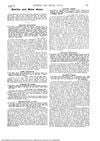7 citations,
August 2020 in “Plastic and reconstructive surgery. Global open” QR 678 and QR 678 Neo are safe and promote hair growth, potentially helping chemotherapy-induced hair loss.
 4 citations,
June 2022 in “BioMed Research International”
4 citations,
June 2022 in “BioMed Research International” Using mesenchymal stem cells or their exosomes is safe for COVID-19 patients and helps improve lung healing and oxygen levels.
1 citations,
August 2019 in “IntechOpen eBooks” Mesotherapy might be a useful addition to dental surgery to reduce drug use and side effects, but more research is needed.
 August 2016 in “Journal of Investigative Dermatology”
August 2016 in “Journal of Investigative Dermatology” Zinc deficiency disrupts hair growth and cycle, but zinc supplements can fix this.
 70 citations,
June 2010 in “Clinics in Dermatology”
70 citations,
June 2010 in “Clinics in Dermatology” Certain groups may need vitamin supplements to improve hair health and prevent other health problems.
 24 citations,
June 2011 in “Andrologia”
24 citations,
June 2011 in “Andrologia” Ganoderma lucidum may help treat enlarged prostate in rats.
 January 2021 in “Turkiye Klinikleri Journal of Dermatology”
January 2021 in “Turkiye Klinikleri Journal of Dermatology” The MPV/PC ratio can help assess disease activity in alopecia areata.
60 citations,
October 2020 in “Journal of Controlled Release” Curcumin nanocrystals in simple gels effectively penetrate hair follicles, but humectants can reduce this efficacy.
 February 2025 in “Stem Cell Research & Therapy”
February 2025 in “Stem Cell Research & Therapy” Maintaining healthy mitochondria may help treat hair loss.
227 citations,
April 2020 in “Cell” More precise, personalized therapies are needed for autoimmune diseases.
 37 citations,
June 2018 in “Clinical and Experimental Medicine”
37 citations,
June 2018 in “Clinical and Experimental Medicine” People with alopecia areata often have lower vitamin D levels and more inflammation, suggesting vitamin D might be involved in the condition.
 August 2016 in “Journal of Investigative Dermatology”
August 2016 in “Journal of Investigative Dermatology” The research found that certain microRNAs are important for human hair growth and health.
 January 2019 in “Springer eBooks”
January 2019 in “Springer eBooks” Modified HDL can better deliver drugs and genes, potentially improving treatments and reducing side effects.
 7 citations,
March 2019 in “Medicine”
7 citations,
March 2019 in “Medicine” Combining light therapy and microneedling shows promise for treating female hair loss.
55 citations,
October 2019 in “The journal of allergy and clinical immunology/Journal of allergy and clinical immunology/The journal of allergy and clinical immunology” The review suggests that other immune cells besides CD8+ T cells may contribute to alopecia areata and that targeting regulatory cell defects could improve treatment.
 November 2023 in “Stem cells and cloning”
November 2023 in “Stem cells and cloning” A new treatment using stem cell-conditioned media significantly improved hair growth in people with temporary hair loss.
 2 citations,
April 2020 in “bioRxiv (Cold Spring Harbor Laboratory)”
2 citations,
April 2020 in “bioRxiv (Cold Spring Harbor Laboratory)” MendelVar is a tool that helps identify important genes by combining GWAS data with Mendelian disease information.
 February 2024 in “International journal of biology, pharmacy and allied sciences”
February 2024 in “International journal of biology, pharmacy and allied sciences” Plant-based treatments can effectively and safely treat hair loss.
12 citations,
August 2013 in “Journal of Dermatological Science” The MAGE3 hypothesis for alopecia areata did not lead to a significant breakthrough.
 22 citations,
January 2017 in “Indian Dermatology Online Journal”
22 citations,
January 2017 in “Indian Dermatology Online Journal” Body hair transplants can treat baldness but differ from scalp hair and need more research on long-term results and side effects.
 3 citations,
February 2016 in “Nature Biotechnology”
3 citations,
February 2016 in “Nature Biotechnology” New drug shows promise for better hair growth in baldness treatment.
 May 1948 in “Journal of the American Medical Association”
May 1948 in “Journal of the American Medical Association” The reply suggests checking for false positive or asymptomatic syphilis and using penicillin for treatment if necessary.
2 citations,
January 2014 in “Chinese medicine” Linkus cough syrup is effective and safe with no side effects or toxicity in rats.
 15 citations,
December 2020 in “Pharmacology Research & Perspectives”
15 citations,
December 2020 in “Pharmacology Research & Perspectives” Blocking enzymes that help the virus enter cells could be a promising way to treat COVID-19.
 55 citations,
February 1985 in “Archives of Dermatology”
55 citations,
February 1985 in “Archives of Dermatology” Using minoxidil on the scalp can help grow hair for people with hereditary baldness.
 40 citations,
November 2016 in “Molecules”
40 citations,
November 2016 in “Molecules” Some plants used in traditional medicine may help treat cancer because they contain proteins that can inactivate ribosomes.
7 citations,
January 2019 in “Journal of clinical medicine research” Menopause causes significant changes in the vaginal introitus, but less so in the labia majora, which may lead to symptoms of vaginal atrophy.
42 citations,
December 2011 in “The journal of immunology/The Journal of immunology” RANKL causes lymph nodes to grow by making certain cells multiply.
 January 2020 in “Elsevier eBooks”
January 2020 in “Elsevier eBooks” Plant-based chemicals may help hair growth and prevent hair loss but need more research to compete with current treatments.
 14 citations,
December 2011 in “Archives of Dermatological Research”
14 citations,
December 2011 in “Archives of Dermatological Research” Phyto-vesicles of β-sitosterol may effectively treat hair loss.




















